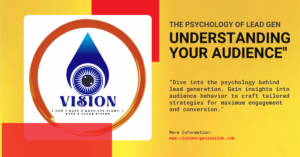The Psychology of Lead Generation: Understanding Your Audience:
Effective lead generation is not just about the tactics and tools – it’s fundamentally rooted in understanding your target audience. By delving into the psychology behind consumer behavior, businesses can craft more resonant and compelling lead-generation strategies that drive meaningful engagement and conversion.
Understand Your Audience’s Psychological Triggers:
The first step in effective lead generation is understanding the psychological drivers and motivations of your target audience. People are influenced by a variety of needs and desires, including the need for security, belonging, recognition, and achievement.
By tapping into these fundamental human motivations, businesses can craft messages that resonate deeply with potential leads.
Emotional appeal is a powerful tool in lead generation. Emotions significantly influence consumer decision-making processes, as evidenced by research. By creating content that elicits positive emotions like happiness, excitement, or a fear of missing out, businesses can forge stronger connections with their audience and increase the likelihood of conversion.
Leverage the Principle of Reciprocity:
The principle of reciprocity is a core aspect of human interaction – when someone does something for us, we naturally want to return the favor.
In lead generation, this can be leveraged by offering something of value, such as a free e-book, webinar, or sample product, in exchange for contact information. This creates a sense of obligation and increases the chances of potential leads engaging with your brand.
Harness the Power of Social Proof:
Humans are inherently social creatures, and we often look to others when making decisions.
Leveraging social proof through testimonials, case studies, and user reviews can be highly effective in lead generation, as they provide real-life endorsements of your product or service and build trust with potential leads.
Optimize for Cognitive Ease and Convenience:
In an age of information overload, cognitive ease and convenience are essential for effective leads. By prioritizing simplicity, clarity, and seamless user experiences, businesses can minimize friction points and make it easier for potential leads to engage with their brand, ultimately increasing conversion rates.
Utilize Data-Driven Personalization:
Harnessing data insights and machine learning algorithms can enable businesses to analyze user behavior, preferences, and engagement patterns, allowing them to deliver personalized experiences that resonate with individual users.
From personalized recommendations to targeted messaging, data-driven personalization can enhance the relevance and effectiveness of leads efforts.
The psychology of consumer behavior plays a crucial role in the success of lead generation campaigns. By understanding the emotional needs, social influences, and cognitive biases of potential leads, businesses can create more engaging, persuasive, and successful leads campaigns. This holistic approach to lead generation, rooted in the science of human psychology, can be a powerful driver of growth and success.
One of the key aspects of consumer behavior is the emotional connection that people form with brands and products. Lead generation strategies that tap into these emotions can be highly effective. For example, a business that sells eco-friendly products might create a leads campaign that highlights the emotional benefits of using their products, such as reducing carbon footprint or supporting a sustainable lifestyle. By appealing to these emotional needs, the business can generate more leads and ultimately increase sales.
Social influences significantly impact consumer behavior. People are more likely to trust and engage with brands that are recommended by friends, family, or trusted sources. Lead generation strategies that leverage social proof, such as testimonials or social media endorsements, can be highly effective in generating leads.
Cognitive biases, such as the confirmation bias or the availability heuristic, can also influence consumer behavior. Lead generation campaigns that take these biases into account can be more effective in engaging potential leads. For example, a business might create a lead generation campaign that uses a catchy slogan or a memorable image to make their brand more memorable and available in the minds of potential leads.

In conclusion, by understanding the psychology behind consumer behavior and aligning lead-generation strategies with the emotional needs, social influences, and cognitive biases of potential leads, businesses can create more engaging, persuasive, and successful lead generation campaigns. This holistic approach to lead generation, rooted in the science of human psychology, can be a powerful driver of growth and success.

